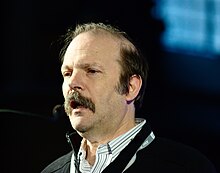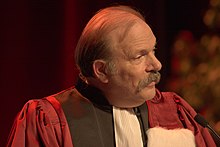Moshe Vardi
Professor Moshe Vardi | |
|---|---|
 | |
| Born | Moshe Ya'akov Vardi 1954 (age 69–70) Israel |
| Alma mater | Bar-Ilan University Weizmann Institute of Science Hebrew University |
| Awards | Gödel Prize (2000) |
| Scientific career | |
| Institutions | Rice University IBM Almaden Research Center Stanford University |
| Thesis | The Implication Problem for Data Dependencies in the Relational Model[1] (1981) |
| Doctoral advisor | Catriel Beeri[1] |
| Website | www |
Moshe Ya'akov Vardi (Hebrew: משה יעקב ורדי) is an Israeli mathematician and computer scientist. He is a Professor of Computer Science at Rice University,[2] United States. He is University Professor, the Karen Ostrum George Professor in Computational Engineering, Distinguished Service Professor,[3] and Director of the Ken Kennedy Institute for Information Technology. His interests focus on applications of logic to computer science, including database theory, finite-model theory, knowledge in multi-agent systems, computer-aided verification and reasoning, and teaching logic across the curriculum. He is an expert in model checking, constraint satisfaction and database theory, common knowledge (logic), and theoretical computer science.[4][5]
Moshe Y. Vardi is the author of over 600 technical papers[6][7][8] as well as the editor of several collections. He has authored the books Reasoning About Knowledge[9] with Ronald Fagin, Joseph Halpern, and Yoram Moses, and Finite Model Theory and Its Applications[10] with Erich Grädel, Phokion G. Kolaitis, Leonid Libkin, Maarten Marx, Joel Spencer, Yde Venema, and Scott Weinstein. He is Senior Editor of Communications of the ACM, after serving as its Editor-in-Chief for a decade.[11]
Background
He chaired the Computer Science Department at Rice University from January 1994 until June 2002. Prior to joining Rice in 1993, he was at the IBM Almaden Research Center, where he managed the Mathematics and Related Computer Science Department. Dr Vardi received his Ph.D. from the Hebrew University of Jerusalem in 1981.[1]
Awards
Vardi is the recipient of three IBM Outstanding Innovation Awards, a co-winner of the 2000 Gödel Prize (for work on temporal logic with finite automata), a co-winner of the 2005 ACM Paris Kanellakis Theory and Practice Award, and a co-winner of the LICS 2006 Test-of-Time Award. He is also the recipient of the 2008 and 2017 ACM Presidential Award, the 2008 Blaise Pascal Medal in computational science[12] by the European Academy of Sciences,[13] the 2010 Distinguished Service Award from the Computing Research Association, the Institute of Electrical and Electronics Engineers (IEEE) Computer Society's 2011 Harry H. Goode Memorial Award, the 2018 ACM Special Interest Group for Logic and Computation (SIGLOG), the European Association for Theoretical Computer Science (EATCS), the European Association for Computer Science Logic (EACSL), and the Kurt Goedel Society (KGS) jointly sponsored Alonzo Church Award for Outstanding Contributions to Logic and Computation (with Tomas Feder).

He holds honorary doctorates from eight universities: Saarland University, Germany, the University of Orleans and Université Grenoble Alpes in France, UFRGS in Brazil, the University of Liege in Belgium, the Technical University of Vienna, Austria, the University of Edinburgh in Scotland, and the University of Gothenburg in Sweden. Professor Vardi is an editor of several international journals and the president of the International Federation of Computational Logicians. He is a Guggenheim Fellow,[14] as well as a Fellow of the Association for Computing Machinery, the American Association for the Advancement of Science, and the American Association for Artificial Intelligence. He was designated Highly Cited Researcher by the Institute for Scientific Information, and was elected as a member of the US National Academy of Engineering, the National Academy of Sciences,[15] the European Academy of Sciences, and the Academia Europaea. He was named to the American Academy of Arts and Sciences in 2010.[16] He was included in the 2019 class of fellows of the American Mathematical Society "for contributions to the development and use of mathematical logic in computer science".[17] He has also co-chaired the ACM Task Force on Job Migration.
References
- ^ a b c Moshe Vardi at the Mathematics Genealogy Project
- ^ "www.cs.rice.edu/~vardi". Retrieved 2012-06-20.
- ^ BOYD, JADE (July 22, 2011). "Rice's Moshe Vardi honored as Distinguished Service Professor". Rice University. Archived from the original on April 10, 2012. Retrieved April 10, 2012.
Rice University computer scientist Moshe Vardi has been named a Distinguished Service Professor, one of the university's most prestigious faculty appointments.
- ^ Moshe Vardi author profile page at the ACM Digital Library
- ^ Winslett, M. (2006). "Moshe Vardi speaks out on the proof, the whole proof, and nothing but the proof". ACM SIGMOD Record. 35: 56. doi:10.1145/1121995.1122008.
- ^ Moshe Y. Vardi at DBLP Bibliography Server
- ^ Moshe Vardi publications indexed by Microsoft Academic
- ^ Moshe Vardi publications indexed by Google Scholar
- ^ Vardi, Moshe Y.; Fagin, Ronald; Halpern, Joseph; Yoram Moses (2003). Reasoning About Knowledge. Cambridge, Massachusetts: The MIT Press. ISBN 0-262-56200-6.
- ^ Weinstein, Scott; Erich Gradel; Kolaitis, Phokion; Leonid Libkin; Maarten Marx; Spencer, Joel H.; Vardi, Moshe Y.; Venema, Yde (2007). Finite model theory and its applications. Berlin: Springer. ISBN 3-540-00428-9.
- ^ Vardi, M. Y. (2012). "Artificial intelligence: Past and future". Communications of the ACM. 55: 5. doi:10.1145/2063176.2063177.
- ^ "THE BLAISE PASCAL MEDAL 2008 (section: "Blaise Pascal Medal in Computational Science")". European Academy of Sciences. Archived from the original on March 4, 2017. Retrieved April 27, 2017.
Professor Moshe Y. VARDI, USA / In recognition of his outstanding contributions in several areas of computational science connected by their use of logic as an underlying methodology. His work has had fundamental and lasting impact on automatic verification, logic of knowledge, database theory, and finite-model theory
- ^ "Does automation doom workers?". (George R. Brown School of Engineering at) Rice University. October 31, 2016. Archived from the original on April 27, 2017. Retrieved April 27, 2017.
the 2008 Blaise Pascal Medal for Computer Science by the European Academy of Sciences
- ^ List of Guggenheim Fellowships awarded in 2005#V
- ^ "National Academy of Sciences Elections", Mathematics People, Notices of the American Mathematical Society, 62 (7): 826, August 2015.
- ^ Rice's Moshe Y. Vardi elected fellow of American Academy of Arts and Sciences.
- ^ 2019 Class of the Fellows of the AMS, American Mathematical Society, retrieved 2018-11-07
- 1954 births
- Living people
- Hebrew University of Jerusalem alumni
- IBM employees
- Israeli computer scientists
- Israeli editors
- Israeli mathematicians
- Israeli science writers
- Fellows of the Association for the Advancement of Artificial Intelligence
- Fellows of the Association for Computing Machinery
- Fellows of the American Association for the Advancement of Science
- Fellows of the American Mathematical Society
- Formal methods people
- Gödel Prize laureates
- Mathematical logicians
- Members of Academia Europaea
- Members of the United States National Academy of Engineering
- Members of the United States National Academy of Sciences
- IBM Research computer scientists
- People from Haifa
- Rice University faculty
